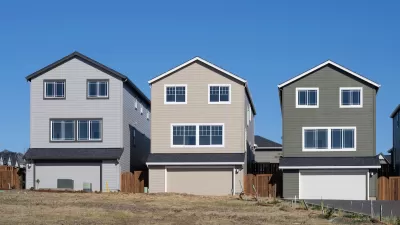There are more rental units in the United States than ever, but fewer of them are available at low cost, so there are more cost-burdened renters than ever, according to new research.

A new working paper from researchers at the Joint Center for Housing Studies documents the decline of low-cost rental units over the past three decades and its impact on low-income renters.
"Although the overall rental stock grew by 10.9 million units between 1990 and 2017, the number of units renting for less than $600 per month (in constant 2017 dollars) fell by nearly 4.0 million," according to an article by Alexander Hermann.
"The data also show that this decline was concentrated in the last five years. After falling modestly in the 1990s and early 2000s, the stock of low-cost units rose in the aftermath of the recession. Since 2012, however, the number of units renting for under $600 has fallen sharply, accounting for a large share of the decline in low-cost units over the long run."

The white paper—written by Hermann and co-authors Elizabeth La Jeunesse, Daniel McCue, and Jonathan Spader—includes analysis of the geographic distinctions in the decline of low-cost rental housing as well as the impact of the decline on low-income, cost-burdened renters.
FULL STORY: NEW PAPER DETAILS THE DRAMATIC DECLINE OF LOW-COST RENTALS

Planetizen Federal Action Tracker
A weekly monitor of how Trump’s orders and actions are impacting planners and planning in America.

San Francisco's School District Spent $105M To Build Affordable Housing for Teachers — And That's Just the Beginning
SFUSD joins a growing list of school districts using their land holdings to address housing affordability challenges faced by their own employees.

The Tiny, Adorable $7,000 Car Turning Japan Onto EVs
The single seat Mibot charges from a regular plug as quickly as an iPad, and is about half the price of an average EV.

Seattle's Plan for Adopting Driverless Cars
Equity, safety, accessibility and affordability are front of mind as the city prepares for robotaxis and other autonomous vehicles.

As Trump Phases Out FEMA, Is It Time to Flee the Floodplains?
With less federal funding available for disaster relief efforts, the need to relocate at-risk communities is more urgent than ever.

With Protected Lanes, 460% More People Commute by Bike
For those needing more ammo, more data proving what we already knew is here.
Urban Design for Planners 1: Software Tools
This six-course series explores essential urban design concepts using open source software and equips planners with the tools they need to participate fully in the urban design process.
Planning for Universal Design
Learn the tools for implementing Universal Design in planning regulations.
Smith Gee Studio
City of Charlotte
City of Camden Redevelopment Agency
City of Astoria
Transportation Research & Education Center (TREC) at Portland State University
US High Speed Rail Association
City of Camden Redevelopment Agency
Municipality of Princeton (NJ)



























